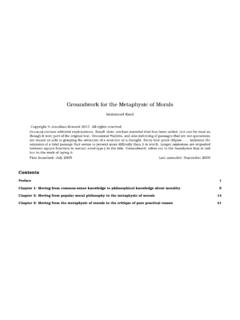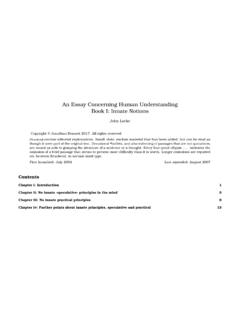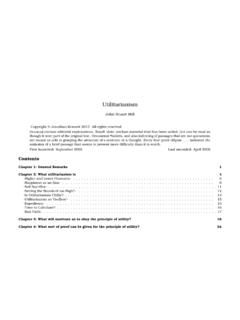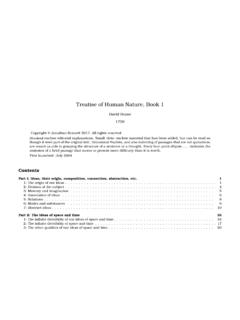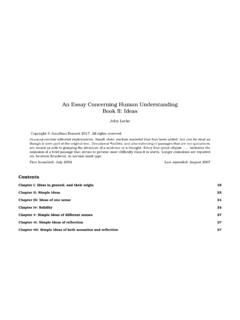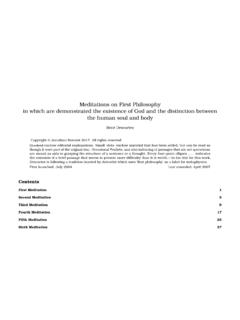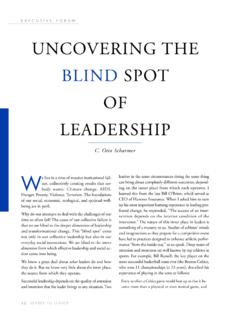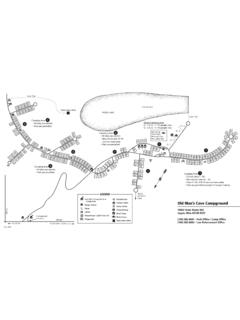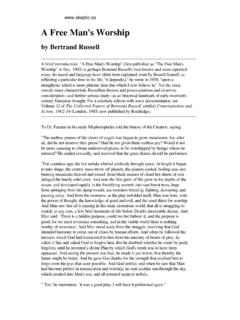Transcription of Man—Machine - Early Modern Texts
1 Man MachineJulien Offray de La MettrieCopyright Jonathan Bennett 2017. All rights reserved[Brackets]enclose editorial explanations. Small dots enclose material that has been added, but can be read asthough it were part of the original text. Occasional bullets, and also indenting of passages that are not quotations,are meant as aids to grasping the structure of a sentence or a thought. Every four-point ellipsis .. indicates theomission of a brief passage that seems to present more difficulty than it is worth. Longer omissions are reportedbetween brackets in normal-sized type. The most recent translation and edition of this work, by Ann Thomson(Cambridge UP 1996), gives much historical and bibliographical material that is needed for a serious scholarlystudy of the work. It also includes translations of other works by La Mettrie that have never before been translatedinto English.
2 The original title isL Homme machine , an odd bit of French two nouns side by side which has tobe translated into odd English. The usual choice has beenMan a machine . Ann Thomson s edition usesMachineMan, which emits an unwanted whiff of Hollywood. (It was chosen not by her but by the editor of her series.) Thedivision into sections is added in this version; it is meant only as a rough guide to the places where new topicsare started launched: December 2009 Man MachineLa MettrieContentsA start on thinking about materialism .. 1 Divine revelation .. 1 Some empirical facts ..3 Food ..5 Other influences ..6 Physical constitution .. 7 The ability to learn ..8 Language ..10 Imagination .. 11 Humanity s assets ..13 Attention .. 14 Man and the other animals ..15 Innocent criminals .. 17 The law of nature ..18 The existence of God ..19 The law of nature.
3 21 Self-moving body parts ..22 The springs of the human machine ..23 More about the organisation of the human body ..26 Feeling and thought .. 27 Solving two riddles ..28 From sperm to man ..30 Reconciling ourselves to our ignorance .. 31 The moral advantages of La Mettrie s view of man ..33 Man MachineLa MettrieFor a wise man, it is not enough to study nature and thetruth; he must be willing to proclaim it for the benefit of thefew who are willing and able to think. As for the rest thewilling slaves of prejudice they can t reach the truth anymore than frogs can start on thinking about materialismPhilosophers theories regarding the human soul? Basicallythere are just two of them: the first and older of the two is materialism; the second is spiritualism.[As you will see, thishasnothingto do with the spiritualism that traffics in communicationwith the dead etc.]
4 ]The metaphysicians who implied that matter might wellhave the power to think didn t disgrace themselves asthinkers. Why not? Because they had the advantage (for inthis case it is one) of expressing themselves badly. To askwhether unaided matter can think is like asking whether unaided matter can indicate the time. It s clear alreadythat we aren t going to hit the rock on which Locke had thebad luck to come to grief in his speculations about whetherthere could be thinking matter .The Leibnizians with their monads have constructedan unintelligible hypothesis. Rather than materialising thesoul like the philosophers I have just mentioned , theyspiritualised matter. How can we define a being like theso-called monad whose nature is absolutely unknown tous?Descartes and all the Cartesians among whom Male-branche s followers have long been included went wrongin the same way, namely by dogmatising about somethingof which they knew nothing.
5 They admitted two distinctsubstances in man, as if they had seen and counted them!Divine revelationThe wisest have said that the soul can be known only by thelight of faith; but as rational beings they claimed the rightto examine what the Bible meant by the word spirit , whichit uses when speaking of the human soul. And if in theirresearch they disagree with the theologians on this point,are the theologians any more in agreement with each otheron everything else?Here, in a few words, is the result of all their reflections.(1)If there is a God, he is the creator of nature as muchas of revelation; he gave us the one to explain the other, andreason to reconcile them.(2)To distrust what we can learn by studying livingbodies is to see nature and revelation as hostile opposites,and consequently to come out with an absurdity that Godcontradicts himself in his different works, and deceives us.
6 (3)If there is a revelation, it can t contradict nature. It sonly through nature that we can discover what the Gospel swords mean: experience is the only guide to that. Previouscommentators have only confused the truth. We ll see anexample of that when we look into the work of the author oftheSpectacle of Nature, Abb Pluche , who writes this aboutLocke: It is surprising that a man who debases our soul tothe point of thinking it to be made of clay venturesto set up reason as the judge and supreme arbiterof the mysteries of faith. What an astonishing ideaof Christianity we would have if we tried to followreason! These reflections, as well as throwingnolight on anything todo with faith, are frivolous objections to the method of thosewho think they can interpret the holy books sofrivolousthat I am almost ashamed of spending time refuting MachineLa MettrieWhat makes reason excellent is not its beingimmaterial(what a grand meaningless wordthatis!)
7 , but its force, itsscope, or its acuteness. Contrast these two: A soul of clay which tackles countless ideas that arehard to grasp, and sees at a glance, so to speak, howthey are related to one another and what they imply; A silly, stupid soul made of the most precious is obvious which of these would be the better soul to have!Blushing at the miserable nature of our origins, as theancient Roman naturalist Pliny did that s not behavinglike a philosopher. What seems to be base is here the mostprecious thing, on which nature seems to have expendedthe most art and effort.[ .. isherethe most precious thing whatdoes La Mettrie mean by here ? Perhaps here on this planet , perhaps here in the case of man .]But even if man had come from alower-seeming source than mere clay , he would still be themost perfect of all beings; and if his soul is pure, noble andsublime, whatever it is made of, it is a splendid soul thatentitles its owner to is a touch of fanaticism about Pluche s system, buteven on its own terms his second mode of reasoning seems tome to be flawed: if our idea of faith is contrary to the clearestprinciples and the most unquestionable truths, we shouldconclude that this idea is false and that we don t yet knowthe meaning of the Scriptures.
8 We owe this to the honour ofrevelation and its are two options. Choose one: Everything both nature itself and revelation isillusion. Faith can be justified by unaided anything be more ridiculous than our author? Ican imagine hearing an Aristotelian saying We mustn tbelieve Toricelli s experiment, because if we did accept it,abandoning nature s abhorrence of a vacuum, what a strangephilosophy we would have![Toricelli did some experiments with aset-up that is now recognised to be a barometer.]I have shown how flawed Pluche s reasoning is1in order(1)to show that if there is a revelation, it isn t adequatelyestablished just by the Church s authority without beingexamined by reason, as all those who fear reason claimthat it is; and(2)to shield from attack the method of thosewho would like to follow the path that I am clearing forthem, interpreting supernatural things which, taken ontheir own, are incomprehensible by the lights that each ofus has received from nature, i.
9 E. interpreting them by thelights of experience and reason .In this territory, then, experience and observation shouldbe our only guides. There are countless relevant empiricaldata in the records of physicians who were philosophers[here= philosophers or scientists ], not in those of philosophers whowere not physicians. Physicians have explored and thrownlight on the labyrinth of man; they alone have revealed thesprings hidden under coverings that hide so many marvelsfrom our sight.[The word translated by spring in this work isressort,which refers only to the insides of wind-up machines, and has nothingto do with natural sources of water.]They alone, calmly surveyingour soul, have many times caught it unawares in its misery,without despising it, and in its grandeur, without admiringit. I repeat: these are the only scientists who have theright to speak on this subject.
10 What could anyone else,especially the theologians, tell us? Isn t it ridiculous to hearthem shamelessly holding forth on a subject they are inno position to understand? It s not just that ( negatively )1 His mistake is obviously that he assumes the truth of his conclusion as one of his MachineLa Mettriethey don t understand it; they have ( positively ) been turnedaway from understanding it by obscure studies that have ledthem into countless prejudices in short,fanaticism whichincreases still further their ignorance of the mechanism ofour although we have chosen the best guides, we ll stillfind many thorns and obstacles in our is a machine such a complex machine that it sinitially impossible to get a clear idea of it or (therefore) todefine it. That is why all the research that the greatestphilosophers have conducteda priori trying to use thewings of the mind, so to speak have led nowhere.

